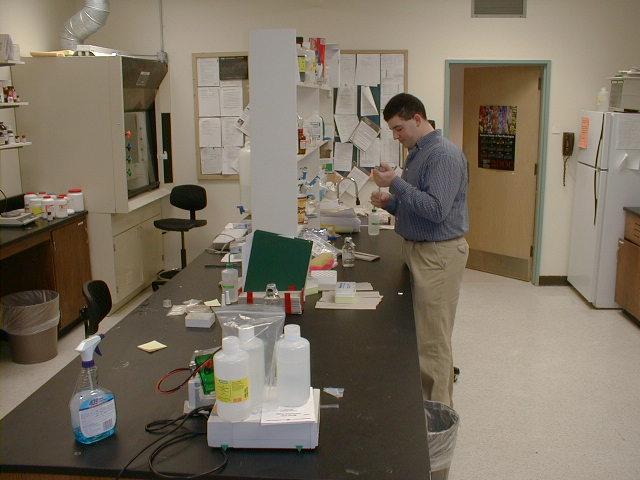Research
Many students at Skidmore do research in plant biology. Opportunities exist during the academic year in BI 375 (Research in Biology), BI 371 (Independent Study) and BI 275 (Introduction to Research). During the summer, students can apply for the Summer Collaborative Research Program. If accepted, the student works ten full weeks in a particular project in collaboration with the faculty member. A stipend plus room and board are provided to the student.
Here is news of some of the recent projects in plant biology that students have undertaken:
- Rachel Roberts, class of 2004, recently completed a summer collaborative research program where she studied plasmolysis and protoplast formation in the green alga. Closterium. Along with fellow student, Becca Flitter, class of 2002, she will present a paper of her results at the Northeast Algal Syymposium this April at the University of New Hampshire.
Two papers of student-faculty collaborative research have recently been published:
-
Composition and synthesis of the pectin and protein components of the cell wall of Closterium acerosum (Chlorophyta), by Ariella Baylson, Brian Stevens and David Domozych; in Journal of Phycology, vol. 37, 796-809 (2001).
-
Calmodulin and its role in the secretory apparatus of the desmid Closterium, by Jamie Linde, Laura Morse and David Domozych; in International Journal of Plant Sciences, vol. 162, 15-27 (2001).
- Jamie Linde, class of 2000, has spent several semesters investigating the protein, calmodulin, in cytoplasmic streaming and the secretory process in planrts. Jamie has done electron microscopic and biochemical work to learn about these systems. Likewise, Jamie has used state-of-the-art computer-regenerated systems to help understand these processes.
**Congratulations to Jamie who is co-recipient of the Donald Pyle Award of 2000 for excellence in research in Biology.
- Ariella Baylson, class of 2000, has performed several semesters of research looking at cell wall proteins and their synthesis in the alga, Closterium. In addition to extensive biochemical work, Ariella has undertaken sophisticated immunocytochemical studies to trace the pathway of cell wall proteins and polysaccharides in the Golgi Apparatus.
**Congratulations to Ariella who is co-recipient of the Donald Pyle Award of 2000
for excellence in research in Biology.
- Brian Stevens, class of 2000, spent the summer and Fall of 1999 isolating the proteins, profilin, myosin and actin from the alga, Closterium. In addition to using electron microscopic techniques, Brian has mastered the technology of preparative electrophoretic separation of proteins. Brian has used the BioRad 491 prep cell to isolate a library of proteins which have then been used for antibody production.
If you are interested in learning about doing research in plant biology, please contact David Domozych, Dana 382.


